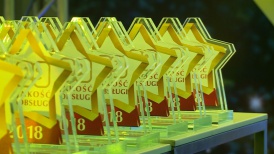| Says: | Rachel Kyte, CEO Sustainable Energy for All, Special Representative of the UN Secretary-General for SEforALL Kjell H. Strøm, Senior Vice President, Cooling Sales and Marketing, Danfoss |
| Function: | Carlo Ratti, architect, engineer and lecturer at the Massachusetts Institute of Technology |
Polish companies are seeking new ways of saving energy, which is crucial for economic development
Both the European Union and national governments have recognised the necessity of increasing energy efficiency, which has an impact on the development of economies. This requires close cooperation between the business sector and companies which excel at implementing new technologies in order to achieve ambitious environmental goals. The business sector plays one of the major roles in sustainable development measures, emphasised the Representative of the UN Secretary-General for Sustainable Energy for All.
“Energy efficiency is the result of a partnership between the private and the public sectors. However, we need to speed up the pace of changes. This is why the business sector must communicate to politicians that it needs specific objectives in order to be able to successfully achieve them. Companies are no longer complaining that specific solutions will be very expensive or will threaten their profitability, but they tell politicians to set priorities for them to implement. This is a fundamental step towards partnership,” Rachel Kyte, CEO Sustainable Energy for All, and Special Representative of the UN Secretary-General for SEforALL, told the Newseria Biznes news agency.
The Representative of the UN Secretary-General for SEforALL emphasised that increasing energy efficiency and sustainable development are objectives which require cooperation between politics and business. She also assessed that companies were dealing well with the change of the business model and with implementing new technologies in order to achieve ambitious environmental goals.
“Over the last five years the business sector has played a crucial role in sustainable development. Since Rio+20, through adopting Sustainable Development Goals and the Paris Agreements, the business sector has shown politicians that if they place emphasis on implementing strategic goals, the business community will follow,” Rachel Kyte said.
“I think in recent years we have managed to prove that we can save a lot of money and do something good for our planet by implementing energy efficiency solutions,” added Kjell H. Strøm, Senior Vice President, Cooling Sales and Marketing, Danfoss. “Global megatrends related to urbanisation, food, the power industry and climate change fuel Danfoss’ s development. These are areas in which we develop our expertise and continue to create new, improved environmentally friendly solutions to foster the sustainable development of cities and increase energy efficiency.”
In the changing power system in which conventional sources will be gradually replaced with renewable energy, it is necessary to construct smart energy-efficient buildings capable of storing energy. In the future this role can be played by supermarkets.
“A supermarket can become an energy efficient building mainly through limiting its energy use. This can be achieved with several simple steps, for instance by paying more attention to closing refrigerator doors, and also through an effective use of cooling systems. For instance, we can store large amounts of energy in refrigerators and release it throughout the day,” Danfoss’s expert emphasised.
Such smart supermarkets form part of the smart city concept. They are equipped with smart infrastructure: electric vehicle charging stations with batteries using energy produced in other systems of the building, solar panel systems providing electric power supply, and systems transferring excess heat to supply the local heating network.
“Most supermarkets are highly interested in increasing energy efficiency. In recent years they have experienced a lot of pressure to increase margins, so such solutions give them an opportunity to increase profitability. This is also a way to do something good for the world. And this, in turn, is important for customers, so in their marketing campaigns companies can promote their environmentally friendly activities,” Kjell H. Strøm said.
The recent trends in technologies serving climate-related and energy purposes as well as innovative concepts of smart buildings and cities of the future were the subject of the Polish edition of Engineering Tomorrow talks (#ETtalks), which is part of the global series of conferences with renowned speakers and visionaries. #ETtalks are organised in various parts of the world by Danfoss Group. One of the guests of Warsaw’s edition was Professor Carlo Ratti, architect, engineer and lecturer at the Massachusetts Institute of Technology.
“Energy efficiency in construction is extremely important nowadays. It is interesting that construction has been completely redefined by new technologies, especially through digitalisation, the Internet of Things, and the possibility of measuring a number of factors and reacting to them. Construction has begun to resemble systems controlled in real time. This is why we are able to respond to some key challenges such as sustainable development and energy efficiency,” Professor Carlo Ratti said.
Trade

Polish consumers are more satisfied than Americans, with the customer satisfaction level being close to 80 percent
For six years the customer satisfaction index in Poland has grown by over 17 percentage points to nearly 78 percent, and it currently exceeds the customer satisfaction levels recorded in the USA and the United Kingdom. Service quality and its growing significance among businesses have had a tremendous impact on customer satisfaction. For the eleventh time the Customer Service Quality Star titles have been awarded to entrepreneurs recording the best results in this field.
